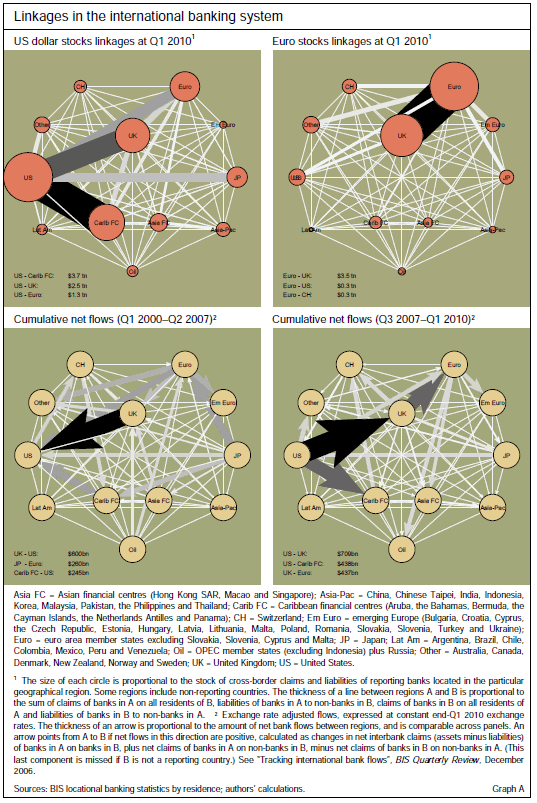
Felix Salmon makes a big mistake:
And while the emerging markets are no strangers to banking crises, the fact is that the most dangerous such crises are always the ones which take place in large, mature economies.
That’s where regulators — by which I mean the Bank for International Settlements, in Basel — have to step in, by forcing all countries to adopt a bare minimum capital requirement which will protect the system in two main ways: it will make bank failures less likely and less frequent, and it will improve the ability of the rest of the system to withstand any bank failure which does still occur.
What's the problem? The BIS is not a regulatory body. It has no statutory authority. The BIS is a talk shop, a place for national regulators (mostly central bankers) to periodically meet and discuss changes in the international financial system, and occasionally hammer out a non-binding, unmonitored, non-enforced agreement. The BIS does a bit of data collecting and dissemination, but that's about it. They can't "force" states to do anything.
This is on purpose. Politicians use regulatory policy to address domestic political concerns, which is why there is a high level of cross-national regulatory divergence despite the fact that the Basel framework has been in place for over two decades. One example is universal vs. split banking systems. In Europe, banks have generally been allowed to participate in investment and commercial banking simultaneously. In the United States, this was not the case until the repeal of Glass-Steagall in 1999, and the Volcker Rule in FinReg partially reinstates that separation. Other differences include varying definitions of regulatory capital as well as how much capital banks must hold[1]. There are many other cross-national variations in regulatory policy, including accounting risk-measurement standards. All of these reflect differences in local banking sectors, which lead to different domestic political incentives. Politicians won't give up their domestic authority or ability to address changing local circumstances, so agreements made in Basel are subject to interpretation, implementation, and enforcement by domestic regulators. The U.S. still hasn't come into full compliance with Basel II, for example, and there is essentially no recourse for other nations or the BIS to force it to do so.
The Basel negotiations periodically occur when one or two leading states become concerned that their firms must take inordinate risks to be competitive in globalized markets. When this risk-taking leads to a crash, or government intervention to prevent a crash, these states seek an international agreement in order to sufficiently protect their firms from some of that competition, thereby reducing the need for as much risk-taking. It isn't a coincidence that the three major instances of Basel negotiations followed periods where increased competition lead to more risk-taking by American (and some European, esp. U.K.) firms, which then lead to a crash or near-crash when some of the bets didn't pay off. The first followed the Latin American debt crisis, the second followed the Asian financial crisis, and the third followed the subprime crisis.
The leading states use these crises to reorganize international markets in ways that protect their firms. Bailing out banks with public funds is obviously extremely unpopular with voters, but causing firms to lose business to less-regulated (or more state-supported) foreign competitors is extremely unpopular with the financial sectors and their employees. Pushing some of the costs of moving to a more regulated system onto foreign firms is one way that powerful states can resolve a domestic political tradeoff.
Thomas and I have a paper about this, about which hopefully more soon, and this general question is what my dissertation is about[2]. I also hope to have more to say about the specifics of the Basel deal as time permits and details emerge. In other words, you'll probably be hearing a good bit more from me about this topic in coming weeks and months.
But this is exactly what I was talking about when I criticized journalists for not knowing more about political science. Not to pick too much on Salmon, who I think is a phenomenal reporter and generally a force for good in the world, but here is a major international negotiation taking place between the most powerful states in the world, and almost everyone is treating it like it's a technocratic problem. It isn't. It's a political problem, and it can only be understood in that context. No one would write about the START treaty this way.
It isn't an accident that the firms screaming bloody murder about Basel III are in Germany and Japan, not the U.S. and U.K. That's not to say that U.S. and U.K. banks love it, and they're certainly not going to say it, but Basel III isn't cutting into them as much as some of their foreign competitors.
Like I said, hopefully more about our paper soon. In the meantime, one of Thomas' previous papers (with Rob Nabors) about the politics of Basel I provides a good framework for thinking about the politics of Basel III.
[1]There is considerable cross-national divergence above the current Basel minimum; the U.S., for instance, has required a 6% Tier 1 ratio and 10% Tier 1 + Tier 2 ratio to be considered "well capitalized". These were 50% and 25% higher than the required Basel minima, respectively. People tend to be very surprised that, historically, the U.S. has tended to have stricter banking regulations than Europe, but it is the case.
[2]The dissertation is still in the planning stages, so I won't make any claims for it yet.
UPDATE: Since Salmon pointed some traffic here, I edited slightly for clarity/poor writing. No substantive changes made.


1 comments:
Great article and highly informative stuff. It is very interesting to see how the sausage gets made. Looking forward to reading the papers you are posting.
Post a Comment